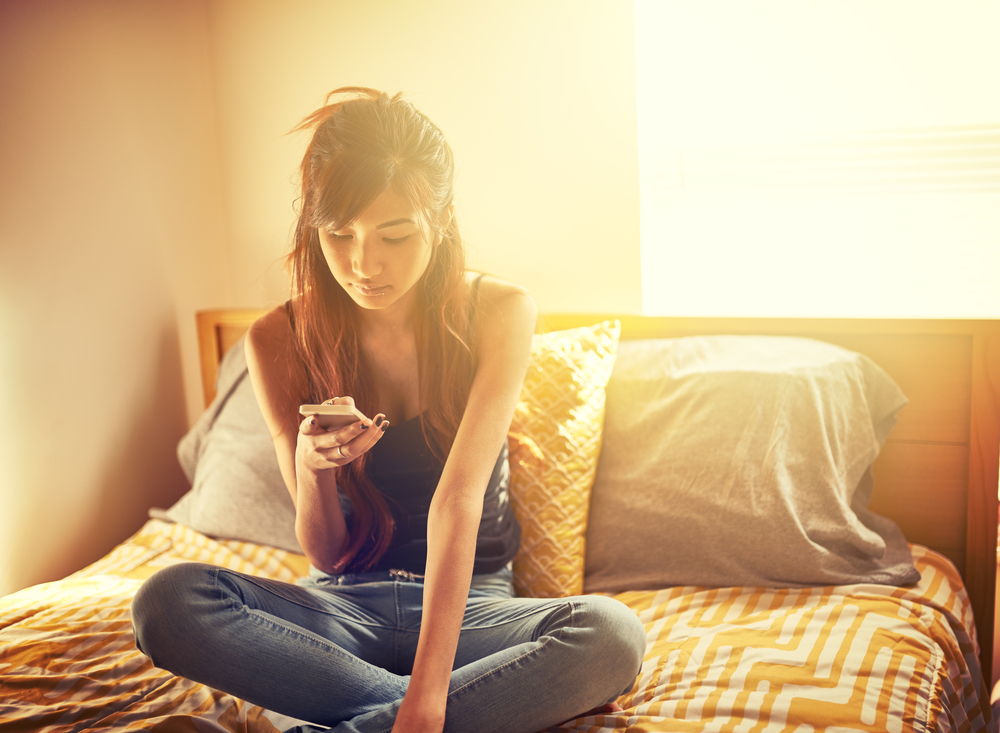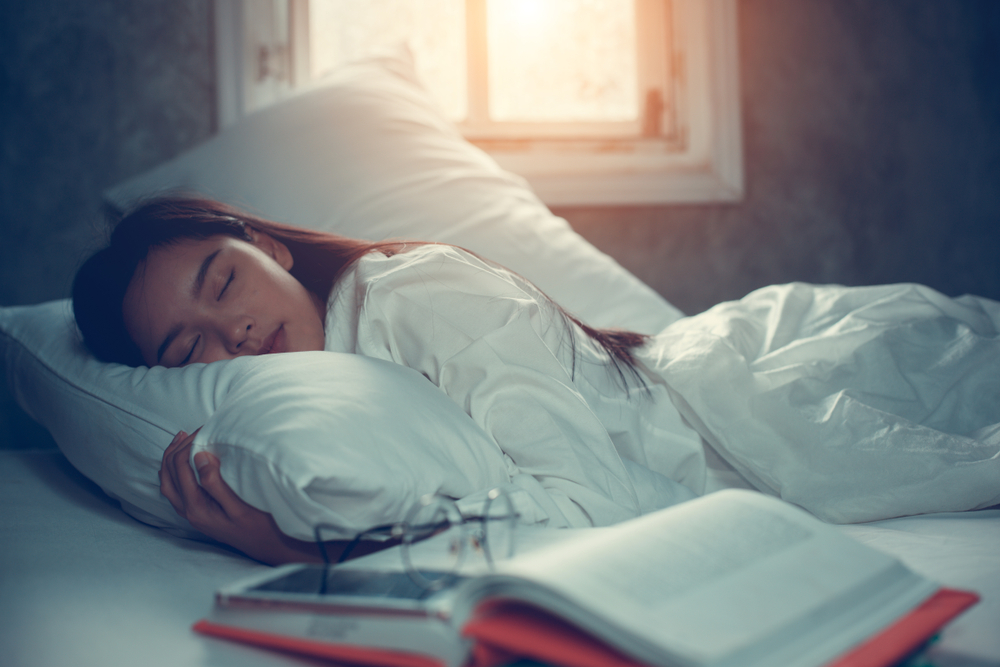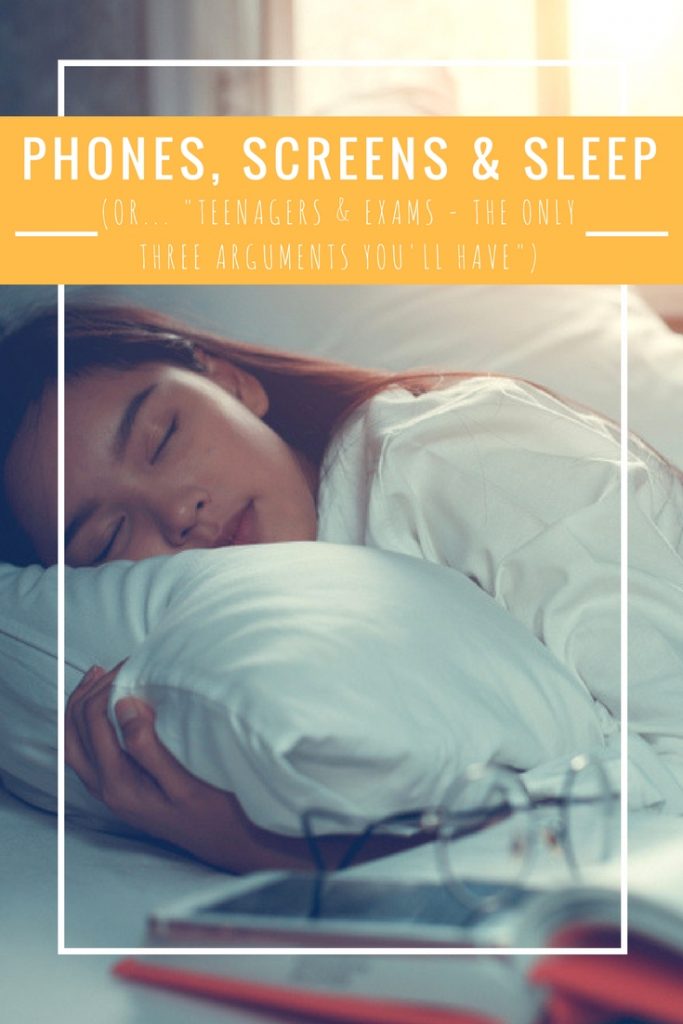Living with an exams-looming teenager is a stressful business, the likes of which your parenting skills have not yet encountered. Publicly declare that you have a revising teen in your house, and parents of now-adult children will eye you with more sympathy then they ever muster for a toddler tantrum. Fellow parents-of-teens will fist-bump you with wild-eyed solidarity. And possibly pass you a glass of gin.
Speaking from experience, if you can negotiate the three hot potatoes of contention – Phones, Screens & Sleep – then you can make life oh so much smoother for you all…

Phones
Right, Let’s get one thing clear. There’s absolutely no point in trying to get your teenager to voluntarily give up their phone. And in my humble opinion, nor should you remove it. The phone is an essential part of your teens life. Remove it – and you’re cutting them off from their social support (utterly crucial in a teens life, particularly during stressful periods) and also from their necessary access for school. You’re literally yanking away one of the legs of their table, and expecting them to become more stable as a consequence.
Your teenagers aren’t babies. They know they have to work hard – and they also know when they’re distracted and not actually working. They will even have a dozen YouTube clips bookmarked to help them with their procrastination. What’s a much more productive discussion with them is figuring out a compromise – perhaps they agree that they switch off for an hour, and at the end of that time you show up with a mug of tea, and they get 15 minutes with a satisfying blast of their social supports. Everyone will find the balance which works for them – the key is not to make it a battleground with your already defensive stresshead teen. Chat with them when they’re calm and happy (yes, do pick your moment carefully!), and work out a way to keep you both happy – and their concentration on track.
Screens
Which leads us neatly on to the next steamingly scorchio hot potato – screens in general.
Unlike a phone, you simply absolutely positively cannot ban screens. Not only are they an intrinsic part of their lives, but they’re also an absolutely essential part of their revision programme. They really do need them – and not in the way they nee-ee-ed that new pair of jeans.
But by now we all know that the blue light from screens triggers brain activity, and therefore disrupts sleep. It’s a basic scientific truth.
Which leads us on to the final steaming hot buttery potato.
Sleep
So – what to do?
Well, I can only share with you what my own experience is. And it’s borne out of long years experience with a child with Chronic Fatigue Syndrome (involving endless sleepless nights), and another child who has always had issues falling asleep, even as a toddler in desperate need of a daytime nap.
Here’s our house sleep rules;

Rule One has nothing to do with bedtime.
Get physically outside during the day. This is non-negotiable. Not only does being out in the sunlight assist to regulate the body clock, but I firmly believe that fresh air and exercise lead to a healthy mind, body and soul. They don’t have to ‘exercise’, mind – just going for a walk is enough to satisfy me (my moody sulky 14yr old’s fifteen minute mooch with the dog has naturally progressed over time into his 16yr old self taking off on a 5k run every day).
Rule Two is a simple 60-minute wind down.
Get off the laptop/tablet, and try and stay away from the phone. If that’s not going to be feasible (bearing in mind they’ve probably been studying with restricted phone access all evening) then at least ensure they have a night mode enabled to remove that blue light issue.
This is the time of night our boys get sociable – they may not have stepped out of their rooms all day, but come ten in the evening and they’re often coming to flump on the sofa and joining us in watching whatever’s on the TV. Or they’re congregating in the kitchen, kettle on, fridge door open, toast grilling (why are they ALWAYS hungry?), sharing new videos they’ve stumbled upon, groaning over new/old memes or animatedly discussing their take on the latest Putin/Trump/Brexit news. It’s actually my favourite part of the day.

Rule Three is sleep.
Ugh. This is actually by far the hardest one. Because just like you can lead a horse to water, but not make it drink, you can get a teenager in bed – and they’ll still be wide awake and staring at the ceiling at two in the morning; by which time naturally all their exam stress and social media worries and my-life-is-a-doomed-failure panics are swilling around in their brains.
Firstly, check their environment. You know that feeling when your house is a mess, or your inbox is scarily full? How it’s nicer to watch TV in the evening when your house is hoovered and the dishwasher empty? Teenagers get that exact same overwhelmed feeling when they see their room as a mess. But they’re too young, and don’t recognise it for what it is. And yes of course they’ll roll their eyes and tell you you’re obsessing over something that’s NOT IMPORTANT RIGHT NOW. But trust your instincts – of course a tidy room helps. Don’t get cross about the mess, though – it’s just a symptom of their struggle to manage their stress and studies.
So don’t add to their stress load, but help them to tidy it out; maybe make it into a mini makeover (if you’re like me, you’re teen is probably still looking at the room they had when they were 12, and it’ll be long overdue a more adult theme). Sort through the piles of accumulated junk, store in the loft their childhood treasures, throw away the sack of rubbish, and create them three separate zones; one for working, one for sitting, one for sleeping. Even the tiniest of kids rooms can manage that.
And then we use our sleep strategies from having a child with a chronic illness . Keep to a regular bedtime. The bed is only for sleeping, not for any other activity at all, not for Netflix watching (if you must, lie on the bed top-to-tail) or even reading – this way your body has a clear physical signal of when to sleep. Keep the temperature cool. Keep it as dark as possible. And above all, remember not to panic if sleep doesn’t come. Sometimes the biggest thing keeping you awake is your worry over the fact that you’re still awake. If you’re still lying wide-eyed after 30 minutes, then get up. Physically get out of bed, and read a book. My children all know that not falling asleep isn’t the end of the world. It happens to all of us, and it’s absolutely okay to just accept it, get up and read instead. The rule is simply that you’re silent, keep light to the absolute bare minimum reading lamp, and to come get me if you’re ill.
And if your teen’s not a reader – well I’ve yet to meet anyone who doesn’t love audio books. Switching everything off and sitting in the dark listening to Stephen Fry reading the Goblet of Fire (other Harry Potters are available…) is one of life’s biggest small joys.
Collins Revision use repeated practice throughout their GCSE guides to make the information ‘stick’ in the student’s brain longer. This ‘revision that sticks’ method is a proven way of doing better in the exams. #RevisionthatSticks
Pinnety-pin it for later…


